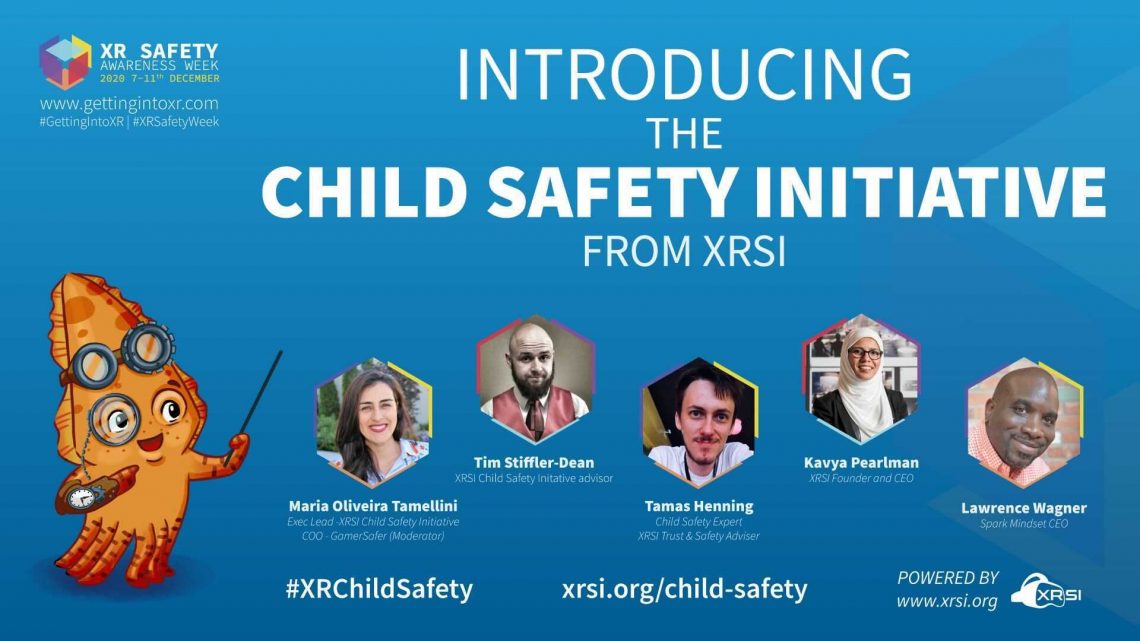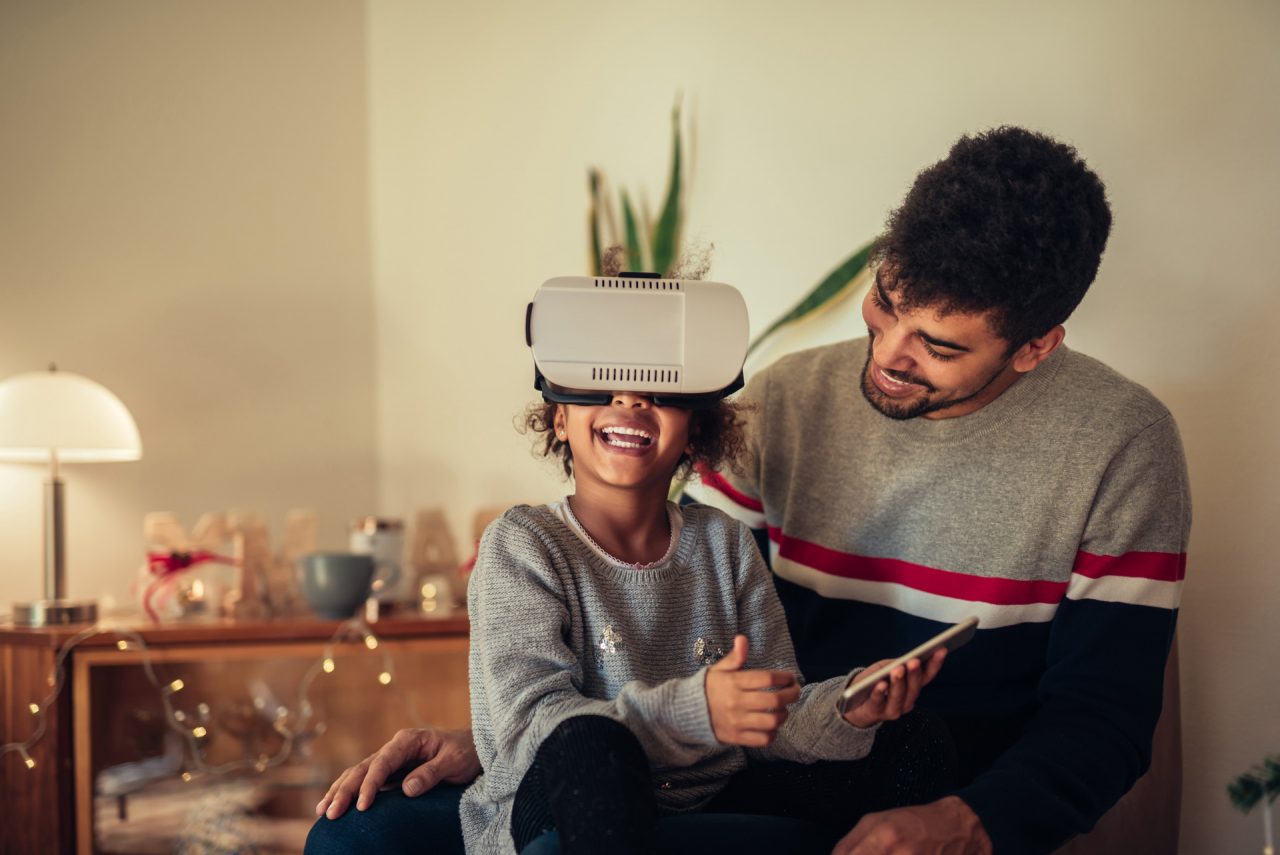If you are among the parents who bought a Virtual Reality (VR) Headset as a Christmas present for your child, you might have some questions about whether this technology is safe for your child or not. XR Safety Initiative(XRSI) and partner organizations anticipated that 2020 is the year the largest number of individuals and organizations will be getting into Extended Reality (XR), i.e., VR, Augmented Reality (AR), Mixed Reality (MR), etc. As reported at the end of October during Facebook’s Earnings call, the new Oculus Quest 2 VR headset was pre-ordered more than five times as much as last year’s original model. The holidays are bound to increase the sales of this device and the VR games and experiences. Beyond VR, with the launch of Project Aria, the era of constant reality capture has already begun.
While we move fast to embrace immersive technologies such as XR and the cost of XR devices continues to drop, the lack of adequate safety measures to protect children in virtual worlds is a prime concern for both parents and child safety advocates. Because of this, XRSI continues to support the parents, guardians, and children with the basic guidance necessary to safely explore these realities. XR safety is not just about the device but also the games and platforms used to Extend Reality. Alongside the hardware sales, Third-party Oculus developers are also experiencing an influx of new users and increased sales of over 800-1000% for various VR games. So, what are we supposed to do? Well, below are some resources that will come in handy to make pragmatic decisions as you give the gift of XR or receive it as a present from one of your loved ones.
Free XR Safety Resources for Parents and Children recommended by XRSI :
Guidance from XR Safety Advocates | XR Safety Awareness Week 2020
Safer Gamers and Children | Rodrigo Tamellini | Singularity Watch S01 E06
Thanks to our Child Safety partners Gamer Safer!
Why is addressing security, safety, and privacy risks against children important?
Virtual Reality and Augmented Reality can be a fantastic medium for entertainment and education, letting adults and children alike feel immersed in the experiences and subjects they’re exploring. Safety is at the heart of these experiences. Proactively reducing Online harms also reduces the costs associated with them. As we adopt Extended Realities, we really need to protect our most vulnerable, our young people across the world, as the digital world is global and has no boundaries. While parents and their children are excited to jump into fully immersive XR experiences, the lack of concrete research and strong standards prevents the industry from confidently ensuring children’s safety and privacy. This shortage of both regulations and data is a catalyst for several concerns: children are entering XR experiences without full awareness of associated risks, parents aren’t empowered by tools or knowledge that will help them protect their children, and businesses developing XR tech are unable to make informed decisions that follow industry standards. Consequently, children can be easily trapped in various malicious activities, including a wide variety of physical, emotional, psychological, developmental, and material threats.
XRSI Launches the Child Safety Initiative

XRSI’s vision of helping build safe, immersive environments starts by protecting the most vulnerable. With no prior standard guidance available for parents or children, and realizing the necessity of appropriate and trustworthy guidance, earlier this month, from December 7th to December 11th, XRSI celebrated the first-ever annual XR Safety Awareness week intending to create safety awareness as well as excitement around Getting Into XR. During the week, XRSI launched a Child Safety Initiative, an effort dedicated to research risks associated with XR. XRSI’s Child Safety Initiative brings together thought leaders, subject matter experts, and visionaries to help build safe and inclusive experiences for children using Extended Reality (XR). Children are exposed to the Internet at a very young age when they are unaware of the risks. For example, the transition from desktop computers to handheld devices gives parents less control over what kids are exposed to. They can access inappropriate content and easily be trapped in fraudulent transactions or other malicious activities. XRSI is committed to address and protect kids from social, economic, and technical risks associated with the use of Extended Reality (XR). When it comes to children in XR, XRSI recommends considering the following:
- Risks associated with Online Content
- Risks associated with Online Users
- Risks Associated with the Technology
- Risks associated with Online and Real Life Identity
Risks associated with Online Content
Inappropriate Advertisements – Most web pages and gaming platforms are filled with digital advertisements. Kids accessing the internet can accidentally or out of curiosity might land on to websites with adult content such as pornography, extreme violence, or content involving hate speech and radicalization.
Scams – Not only adults but children are very much vulnerable to online scams such as False marketing. Clicking on links claiming large sums of money and requesting payment to proceed further are very common. Digital Sweatshops is a recent threat to teenagers looking for extra and easy income. If we dig deep into the kind of work and money paid for jobs as small as solving captchas, it seems more like an exploitative practice.
Risks associated with Online users
Fake users – One of the most critical risks associated with online platforms is user identity. Whether they are console, web, or computer-based, many video games allow users to play with people they have met only online. Thus, you can never be sure about who your kids are interacting with online. Their motives could be sexual, abusive, fraudulent, or other criminal activities. Anonymous users can take advantage of such platforms to harass, bully, and sometimes gang up on other players, sending or posting negative or hurtful messages. Such practice is known as Cyberbullying.
Identity Theft – malicious individuals can gather information about online users from the profiles they have created in games and other sources. They may use it to establish accounts in their name, resell it, or use it to access their existing financial accounts.
Bad Actors/Unethical Hackers – They love the Internet of Things because it is simpler to access resources when interconnected, and the internet is accessible. With notorious objectives, they might get into the system using social engineering and access confidential information, images, etc., thus posing a risk to online users’ confidentiality.
Risks Associated with the Technology
Viruses and computer – Viruses may arrive as attachments in email messages or via instant messaging programs. Corrupt or malicious programs may be hidden in-game files you download the software you install.
Malicious Software – Viruses and worms may be used to install malicious software on your computer. Malicious individuals may also take advantage of the social networks associated with online games that rely on chat, email, or even voice communication to entice you to visit bogus web sites or open email attachments containing malicious software and install this software on your computer. They then use this software for a variety of illicit purposes.
Insecure Game Coding – The protocol used for communicating game information between machines are mostly not implemented securely. Game code may not be as well scrutinized as more popular.
Risks associated with Online and Real Life Identity
In Real Life (IRL), your identity is generally associated with online activities. Still, VR gives us the freedom to create an online persona that may be entirely different than your IRL identity. When it comes to Facebook Reality Lab’s Oculus Quest 2, a VR headset that most parents are likely to be attracted to due to the price point and the technical features the device offers, things get more complicated. In August 2020, Facebook announced that after January 1, 2023, Facebook will end support for Oculus accounts and mandate a Facebook login to access the Oculus platform and related services. Along with the 13+ age restriction, this policy has many parents and children confused. This is why XRSI has conducted several discussions and created free infographics for parents and children available for download via the XRSI website. Mandated Facebook login has left many international lawmakers concerned, and many XR Safety experts sound the alarm. The massive use of Facebook’s social media platform already raises questions about whether it helps humanity or instead hurts us. When combined with XR technology, the risks appear to be monumental and not yet fully understood. Earlier in December 2020, I told Newsweek about the potential dangers of combining XR with Facebook, i.e., “the troubled child of Silicon Valley” could potentially turn people into “data cattle.”
What should you do?
As a parent, you may feel the pressure to purchase the next best gadget for your child, and as a child, you may be tempted to buy the next best VR device, game, or platform. No matter who you are, and whatever your age, race, religion, or gender is, I encourage you to choose wisely. Understand the risks associated with Getting into XR before you step into these new realities or present the means of getting into XR to your loved ones. One thing you do not want to do is an experiment on the developing brain of your children that are under 13. While there is little research to establish exactly what kind of experience is acceptable for a developing brain, several research and studies suggest that the human brain remains under construction and vulnerable to manipulation during adolescent years. So this holiday season, prioritize SAFETY FIRST by making rational and safe choices about Virtual Reality and don’t let your Present 🎁 endanger your future or the future of your child. Extend Reality with Awareness!!
Free XR Safety Resources for Parents and Children recommended by XRSI :
Guidance from XR Safety Advocates | XR Safety Awareness Week 2020
Safer Gamers and Children | Rodrigo Tamellini | Singularity Watch S01 E06
Thanks to our Child Safety partners Gamer Safer!






